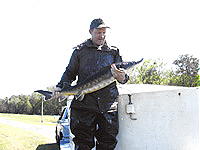
The U.S. Fish and Wildlife Service (FWS) is now seeking proposals from states and U.S. territories interested in acquiring land or planning for endangered species conservation. Through the fiscal year 2006 appropriation from Congress, more than $70 million is available in the Cooperative Endangered Species Conservation Fund for conservation planning activities and habitat acquisition for federally protected species.
Proposals must be submitted to Service Regional Offices by March 20, 2006.
“Our ability to successfully conserve threatened and endangered species ultimately depends on working cooperatively with our partners,” said Interior Secretary Gale A. Norton. “These grants will provide the means for States to work with private landowners, communities and tribes to protect vital endangered species habitat.”
The Cooperative Endangered Species Conservation Fund is authorized under Section 6 of the Endangered Species Act, and provides grants to states and territories to support their participation in a wide array of voluntary conservation projects for listed species, as well as for species that are either proposed or candidates for listing.
“Providing grants to our state partners is one of the most important tools we have to conserve imperiled species,” said Service Director Dale Hall. “We are proud to support state efforts to build long-term conservation partnerships and foster voluntary stewardship efforts nationwide.”
The Service is seeking proposals for the following three Cooperative Endangered Species Conservation Fund categories:
* Recovery Land Acquisition Grants – These grants provide funds to states and territories for acquisition of threatened and endangered species habitat in support of approved recovery plans. Acquiring habitat to secure long term protection is often an essential element of a comprehensive recovery effort for a listed species.
* Habitat Conservation Planning Assistance Grants – These grants provide funds to states and territories to support the development of Habitat Conservation Plans (HCPs), through the support of baseline surveys and inventories, document preparation, outreach, and similar planning activities.
* HCP Land Acquisition Grants – These grants provide funds to states and territories to acquire land associated with approved HCPs. Grants do not fund the mitigation required of an HCP permittee; instead, they support acquisitions by the State or local governments that complement actions associated with the HCP.
By law, the state or territory must have a current cooperative agreement with the Service and contribute 25% of the estimated program costs of approved projects, or 10% when two or more states or territories undertake a joint project. The grants are expected to be awarded in summer 2006.
For more information about these grants and grant application requirements contact: U.S. Fish and Wildlife Service, Division of Consultation, Habitat Conservation Planning, Recovery and State Grants, 4401 N. Fairfax Drive, Room 420, Arlington, VA 22203, 703-358-2106.
Information also can be accessed at www.fws.gov/endangered/grants .
The Cooperative Endangered Species Conservation Fund is identified in the Catalog of Federal Domestic Assistance as number 15.615.
The U.S. Fish and Wildlife Service is the principal Federal agency responsible for conserving, protecting and enhancing fish, wildlife and plants and their habitats for the continuing benefit of the American people.
FWS manages the 95-million-acre National Wildlife Refuge System, which encompasses 545 national wildlife refuges, thousands of small wetlands and other special management areas. It also operates 69 national fish hatcheries, 64 fishery resources offices, and 81 ecological services field stations.
FWS enforces Federal wildlife laws, administers the Endangered Species Act, manages migratory bird populations, restores nationally significant fisheries, conserves and restores wildlife habitat such as wetlands, and helps foreign and Native American Tribal governments with their conservation efforts.
FWS also oversees the Federal Assistance program, which distributes hundreds of millions of dollars in excise taxes on fishing and hunting equipment to State fish and wildlife agencies.



Be the first to comment